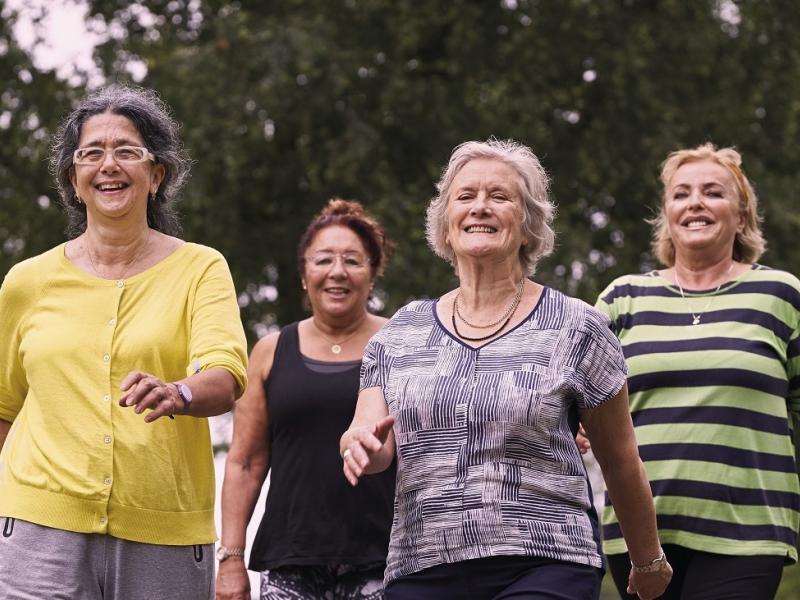Sport for development can play a “critical role” in supporting healthcare professionals and link workers around social prescribing, and subsequently needs to become “more visible in a policy and funding context", according to public health experts, academics and VCSE representatives speaking at the Sport for Development Coalition’s first ‘Town Hall’ session.
The Town Hall sessions have been designed to provide informal opportunities for a cross section of the organisations and networks who make up the Coalition to engage on important issues for sport for development, and drive its collective response to them. The sessions will take place once every two months – alternating with induction sessions for new Coalition members – and provide vital input to the Coalition’s collective policy advocacy, for example in its submission to the Government’s forthcoming Comprehensive Spending Review.
The first session saw sector leaders from Public Health England, Open Minds Active, Brunel University London and StreetGames share their reflections on Integrated Care Systems, followed by an open discussion with more than 60 colleagues from across the Coalition network representing VCSEs (voluntary, community and social enterprise organisations), national networks and charities, Active Partnerships, Club Community Organisations from the RFL, Premier League and EFL, and sports councils including Sport England and Sport Wales.
COLLABORATIVE
Jamie Blackshaw, National Lead for Physical Activity and Healthy Weight for Public Health England, praised the ‘collective action’ and collaborative approach which guides the Coalition, with organisations and networks coming together to deliver on shared outcomes during the Covid-19 pandemic.
“I know that the sector really responded through the adversity, and to support the most vulnerable – during this time of crisis – to remain active, connect as much as they could and also to adapt to support communities,” he said. “Collaboration enabled that to happen.”
Jamie claimed the Coalition network has a “very critical role” to play, and added: “The work that you are doing is vital. We all live and work in local places and that local context and relevance is what matters; it’s imperative when it comes to the desire and ambition that we all have to tackle local health inequalities.
“That level of experience and intelligence, and those relationships that you have formed, are critical in my mind to help us shift away from the status quo, and that co-development when it comes to universal and targeted approaches (to healthcare), and what you can bring to that in terms of this evolution of Integrated Care Systems is invaluable.”
Jamie highlighted recent Public Health England research conducted with the University of West England, working in four areas of the country to understand “how to engage NHS system leaders in whole system approaches to physical activity”.
“The themes that emerged from that analysis were of a shared vision – not just a shared vision that is top down, but is bottom up and co-produced; one that can enable the local system to come together, through the distributed system leadership and not rely on individual system leaders in their own silos.”
CRITICAL
Jamie also spoke of the importance of “taking time to build those relationships, and putting the effort in to develop a shared vision”. He added: “It suggests to me that there is a very critical role here for the Coalition, and organisations on the [Town Hall session], in how to enable healthcare professionals to do that.”
Sima Allen, from Open Minds Active, highlighted racial inequalities and discrimination as one of the key barriers inhibiting the benefits of sport and physical activity interventions being enjoyed by specific groups and communities, and where sport for development could potentially help to provide solutions. “People of colour have to deal with barriers of access but also discrimination which is not spoken. People don’t go because they are afraid of being discriminated (against),” she said.
Sima explained. “I think we need to advocate for safe spaces where there is no discrimination, spoken or unspoken. As a counsellor I have seen how people are afraid, there is some kind of self discrimination and stigma attached to these services.”

Louise Mansfield, Professor of Sport, Health and Social Sciences at Brunel University London, said the sport for development sector has been “brilliantly active…. in designing, delivering and evaluating community sport and physical activity in really complex community contexts for decades”.
But she added: “The question for me is, what does the reinvention of an integrated healthcare system mean for (the community sport sector)? The sports sector is supremely placed to tackle these local contexts of inequality but it does require an integrated community strategy, and a place-based one.
“Perhaps there could be a more formal approach to renewing and strengthening this kind of work, and definitely making it more visible in a policy and funding context? This work often takes place in situations of limited funding, and seeking to address that is really important.”
RECIPROCITY
According to Louise, the community sport system is “increasingly being endorsed” in the UK, Scandinavia and Australia “as a setting in which the public health and sport workforces can come together to increase capacity in supporting population-level health and wellbeing”.
She added: “There is a role for the public healthcare professional in understanding the significant role of community sport in public health and wellbeing, and this area is less well developed – we need that reciprocity. I think pushing this agenda solely to the GP, medical and clinical area is problematic because those roles are already at capacity and a focus there it also misses the great skills, knowledge and expertise that the sport sector has.”
Paul Jarvis-Beesley, Head of Sport and Health at StreetGames, warned that despite social prescribing “having a heyday”, children and young people are still missing out. “NHS England has describe social prescribing as an ‘all-age service’ but it’s availability is far from evenly distributed across our age groups, and that is partly down to the local decision-making and partly down to national priorities and guidelines,” Paul commented. The good news, though, is that “new services are appearing all the time”, he said.

This will be essential in tackling the inequalities which have been exacerbated by the pandemic, Paul added. “It’s our poorest and most underserved young people who have come out worst,” he said, citing evidence from Professor Sir Michael Marmot’s Covid-19 review on health inequalities.
“I’ve been around the youth voluntary sector long enough to personally witness the transformational change that the under-sung heroes in our local communities have brought through sport, and those heroes – the coaches, volunteers, youth leaders – have turned around individual lives against the odds. It happens more than you think, but less than we need.
“It will only work if those VCSE (voluntary, community and social enterprise representatives) who are involved in social prescribing are fully equipped with the time, knowledge and resources to do it properly – it must be a level playing field.”
Headlines for future collective action following the session included enhanced collective advocacy on the need for further shifts from ‘project-based’ to ‘core’ funding that engages funders and commissioners at all levels, and the sharing of further insight, learning and research on how sport for development organisations are able to build and maintain the trust of diverse communities, and people who have faced discrimination and additional barriers to participation.
Sign up to the next Town Hall on November 5th.
Pic credit: EFL Trust, Preston North End Community Trust.



